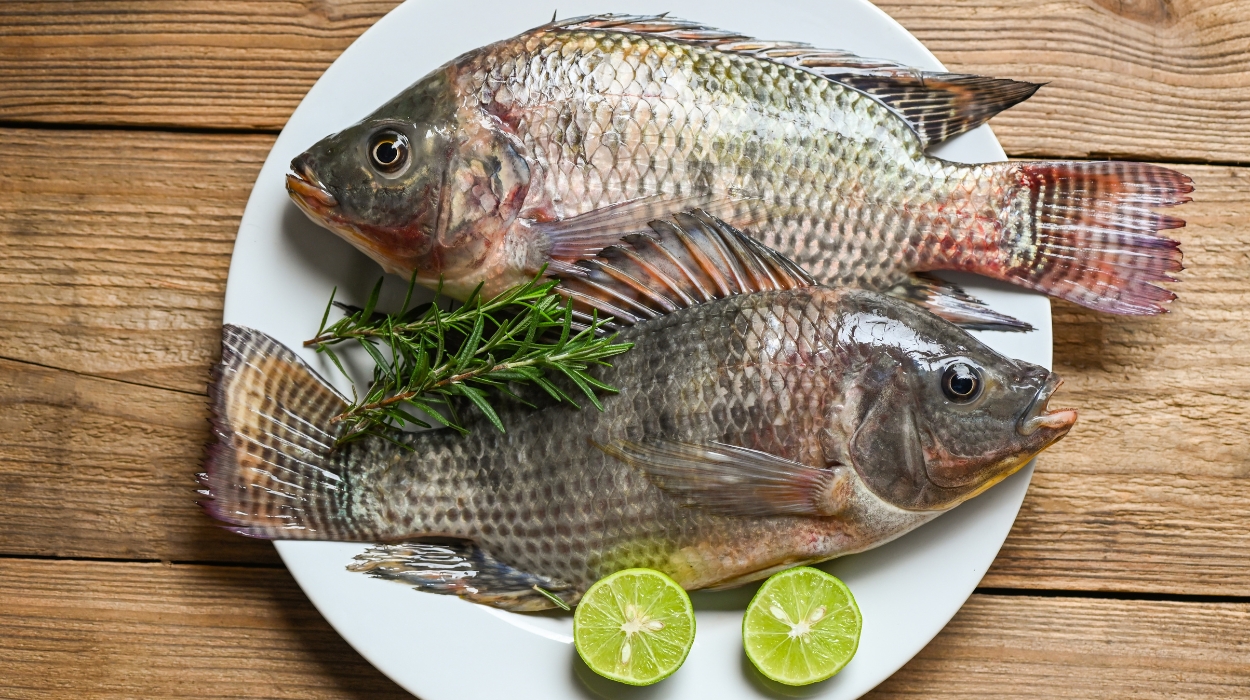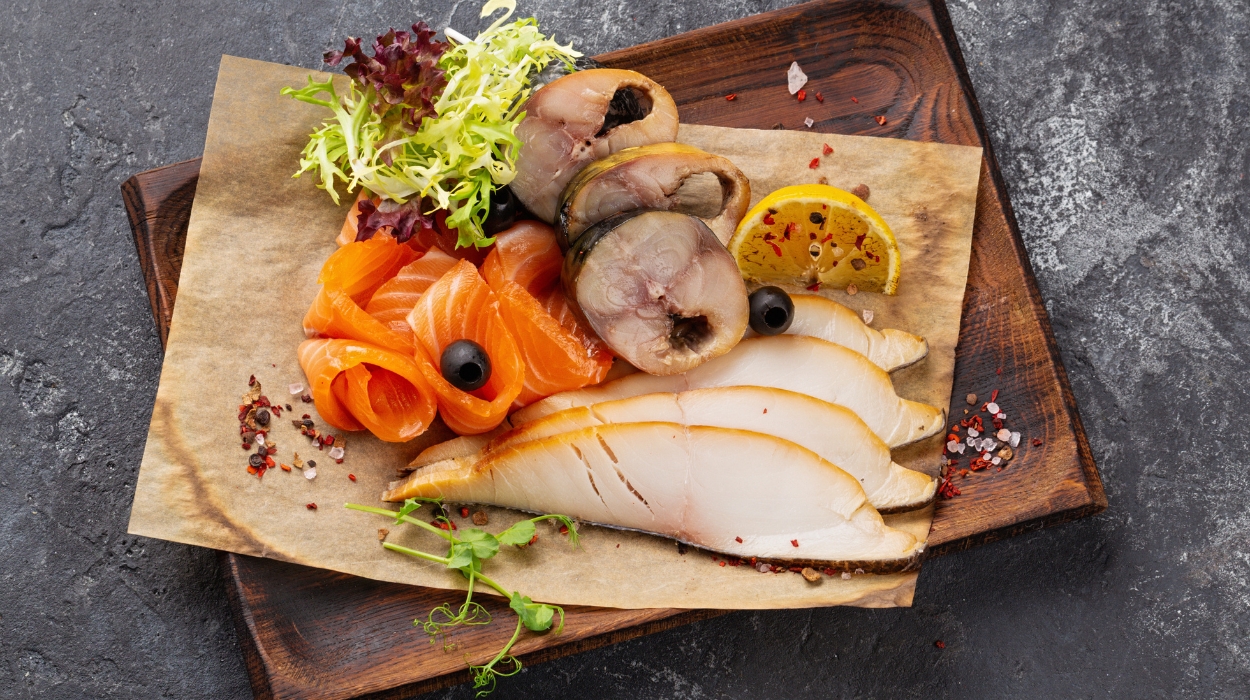Across the world, fish is a good source of protein[1] for many healthy diets. Numerous people consume fish as lean protein sources and low-calorie foods for weight loss, but what is the best fish to lose weight?
Most fish offer a list of health benefits, but some fish can be more supportive of healthy weight loss efforts. Tilapia[2] is at the top of the list, followed by yellowfin tuna, halibut, salmon, and cod. Fish boasts an impressive nutritional value, as it’s rich in essential minerals and vitamins.[3]
Read on to learn more about the best fish for cutting weight as you seek to build muscle mass in ]Year]
Best Fish For Cutting Weight
The best fish for cutting weight include
- Tilapia.
- Yellowfin Tuna.
- Halibut.
- Salmon.
- Cod.
- King Mackerel.
Best Fish To Lose Weight
Can fish help you lose weight? Is salmon good for weight loss? If you wonder if you should eat more fish, read on and learn more about the best low-calorie fish options.
Tilapia

If your wellness goals include losing weight through effective weight-loss diets, meeting your protein needs is essential. Fish, especially tilapia, remains one of the best sources of high-quality protein.
Tilapia is a favorite for many since it’s affordable, offers many nutritional benefits, and has a mild flavor. It’s one of the best fish for weight loss and muscle building. Tilapia is an excellent source of protein, providing 23 grams of protein[4] and 111 calories per filet.
Additionally, tilapia contains key nutrients, such as calcium,[5] magnesium, iron, phosphorus, potassium, sodium, zinc, vitamin B-6, folate, niacin, and choline.
Yellowfin Tuna
Tuna is another popular type of fish that people enjoy, hence its nickname, King of the Sea. In fact, tuna is a staple in numerous diets worldwide. You can eat different types of tuna to lose weight, including the large yellowfin tuna.[6]
Yellowfin tuna is a good option if you prefer a meaty fish with a mild flavor. You can eat it raw in sushi or prepare it with several different cooking methods.
Yellowfin tuna can promote weight loss as you seek to live a healthy lifestyle. It has a low-calorie count since a 3-ounce filet[7] provides only 110 calories. Additionally, you get 25 grams of protein and 0.5 grams of total fat.
It’s important to note that yellowfin tuna has red meat when raw, but it’s healthy to eat. As a good source of omega-3 fatty acids,[8] including tuna as part of a delicious meal can be good for your health. You can buy it as fresh, frozen, smoked, or canned.
Halibut
Another excellent fish option with a low-calorie count is halibut. This fish is a good source of lean protein[9] and a rich source of healthy fat in the form of omega-3 fatty acids.
Halibut is a type of flatfish that provides nutrients such as selenium and phosphorous. A 3-ounce filet s of raw Halibut has 16 grams of protein,[10] 1.1 grams of total fat, and 77 calories. It also contains vitamins B12 and B6, phosphorus, niacin, and magnesium.
It’s an excellent option when seeking the best fish to eat when trying to lose weight. One concern you may have is the mercury level. Halibut and other fish may contain mercury, a harmful metal.
Salmon

A healthy diet may have salmon featured in its delicious meals. People who eat fish enjoy salmon[11] and for good reasons. Frankly, it’s a healthy, fatty fish to eat for weight loss.
Salmon comes in different varieties, including coho, king, and pink. It has a buttery flavor when cooked and contains fewer calories than fish types.
For starters, a 3-oz filet of raw salmon provides 177 calories[12] and 17.3 grams of protein. The same amount of fish has 11.4 grams of total fat, including 3 grams of saturated fat.
In terms of nutritional content, salmon is a good source of phosphorous, potassium, selenium, thiamin,[13] folate, and vitamins B12, B6, and D The good news is you can prepare salmon in numerous ways, including baking and grilling. Smoked salmon is a commonly enjoyed dish.
Cod
Another healthy fish to eat for weight loss is the oily fish cod. It’s common to come across cod[14] at the fish market or supermarkets as it offers a distinct taste and many health benefits.
This white fish provides lots of vitamins and minerals essential for better body function. A 3-oz filet of cooked cod provides 89 calories and 19.4 grams of protein.[15] In terms of minerals and vitamins, expect to enjoy more zinc, sodium, potassium, selenium, niacin, and vitamin B12.[16]
King Mackerel
Lastly, consider stocking your fish varieties with the delicious king mackerel.[17] It’s one of the most commercially fished varieties in the world, and for good reason. It’s packed with loads of nutrients and has a delicious flavor.
As you work to eat a balanced diet, adding king mackerel ensures you eat enough protein. Note that a 3-oz filet of raw king mackerel provides 17.3 grams of protein[18] and 89 calories. The tasty fish is also a good source of potassium, sodium, phosphorous, selenium,[19] vitamin B6, and vitamin B12.
Benefits Of Eating Fish For Weight Loss
Eating seafood, especially certain fish, offers other health benefits in addition to weight loss support.
Low-Calorie Food Option
Meat can be an excellent source of protein. However, when comparing calorie counts, fish is better than red meat since it has fewer calories[20] and less saturated fat. As a result, you can lose weight by eating fish like tuna and salmon.
May Help Build Muscle Mass
Eating fish can also help build muscle mass[21] while working to reach a healthy weight. Consuming fish can help reduce belly fat and tone your body quickly, especially if you opt for lean protein with fewer calories.
Lean fish is an excellent source of protein that the body needs to build muscle mass. Protein building blocks[22] or amino acids in your muscles require frequent replenishing. Eating fish helps you retain muscle by supplying the body with more building blocks for muscle tissue.
Good Source Of Healthy Fats
Not all fat is bad. Healthy fats play a key role in a sustainable weight loss diet. Good fat is crucial since it provides energy and supports nutrient absorption. The best fish to lose weight provides a good source of healthy fats.[23]
Another reason to eat foods that offer dietary fat is to promote satiety. Good dietary fats[24] are the last to leave the stomach during digestion, so you feel fuller longer. As a result, you avoid eating more calories, which can lead to weight gain.
May Help Reduce Inflammation
Is sushi good for weight loss? Does fish have anti-inflammatory properties that fight inflammation? The answer to both questions is yes.
Eating sushi can help boost weight loss as you consume more omega-3 fatty acids that help boost metabolism.[25] Research shows that omega-3 fatty acids have anti-inflammatory properties[26] that protect the body against free radicals that lead to illnesses.
May Help Improve Brain Function
Finding ways to protect and promote cognitive function is crucial, especially with aging. Gladly, eating fish may help improve brain function.
Omega-3 fatty acids common in fish varieties improve cognitive brain function[27] and protect the brain. That’s why you find omega-3 fatty acids as part of some dietary weight loss supplements.
May Boost Good Heart Health
Many have seen commercials showing that eating fish and taking fish supplements are good for your heart. Well, it’s not all a marketing gimmick, as fish can be good for your heart.[28]
In fact, eating fish low in calories and rich in omega-3 fatty acids can help prevent strokes and heart attacks. Fish is low in cholesterol,[29] unlike red meat and other foods to avoid for weight loss.
How? Omega-3 fatty acids help reduce triglycerides, a type of unhealthy fat in the blood. A high level of triglycerides puts you at risk of heart disease and other illnesses, such as high blood pressure.
Ways To Eat Fish And Lose Weight
While some people might delight in deep frying fish to make fish sticks, it’s best to limit or avoid fried fish if you seek to lose weight. Frying leads to consuming loads of unhealthy fats that sabotage efforts to reduce belly fat.
Instead, opt for healthy ways to eat fish and lose weight. You can eat raw fish as sushi, but be sure to consume safe raw fish.
Other ways of consuming fish are baking, poaching, grilling, or steaming. The goal is to reduce the chances of adding unhealthy fats that can lead to weight gain. You can also use olive oil to prepare fish at home while taking the best thermogenic fat burners to stay lean.
What Is The Best Time To Eat Fish For Weight Loss?
Eat fish during lunchtime or for dinner. Fish is a good source of lean protein and can help you stay fuller longer. Picking foods that promote satiety is good for your diet as you strive to lose weight.
The longer you feel full, the less likely you are to snack or eat more calories. Reducing food intake works well as you strive to lose belly fat and get in shape.
Is Seafood Good For Weight Loss?
Absolutely, it can be. Seafood remains a healthy addition to any weight loss diet.
Is shrimp good for weight loss? Fish, crustaceans, and other varieties are low-calorie food options, supporting efforts to reach a calorie deficit.
Another reason to eat seafood to lose weight is to feel full for longer. As mentioned above, seafood with a high protein content leaves you feeling fuller for longer. As a result, you consume fewer calories and can lose weight without the best diet pills.
Conclusion
Make it a habit to eat the best fish to lose weight today. Adding fish to your diet can be beneficial, as these are low-calorie food options with many health benefits.
Fish varieties include tilapia, yellowfin tuna, halibut, salmon, cod, and king mackerel. All are low in calories and high in lean protein content. Additionally, your body benefits from loads of vitamins and minerals for better function.
Consult a registered dietitian for the best fish-food combinations.
Frequently Asked Questions
Cod is the best fish to eat to lose weight since there are only 70 calories in a 3-oz filet.[16] However, you can opt for tilapia, yellowfin tuna, salmon, halibut, and king mackerel, all of which have a low-calorie count.
Fish is good for losing belly fat since it has a high protein content. Protein helps you feel fuller longer, and you are less likely to eat more calories.
Cod has the lowest calories of all the fish varieties listed above. There are only 70 calories per 3 oz of cod.
You can lose weight if you eat fish daily. However, it’s essential to maintain a balanced diet and eat healthy meals.
 Evidence Based
Evidence Based
